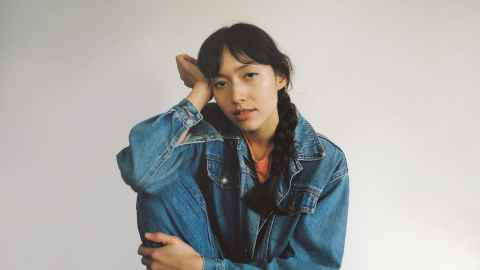Amelia Murray
Amelia Murray, the woman behind the dream-pop music project Fazerdaze, never missed a single class while studying at Waipapa Taumata Rau, University of Auckland.

“My three years doing the pop music degree were intense – we were constantly performing, songwriting, and analysing songs,” she says.
Along with studying, she went to as many gigs as possible, interned at a record store and music magazine, and worked at a music venue.
“I wanted to absorb as much as I could,” she says. “In many ways, the degree felt like I was betting on myself.”
That bet paid off. Earlier this year Fazerdaze won Album of the Year and Best Solo Artist at the 2025 Aotearoa Music Awards, before embarking on a tour across the United States with her musical heroes, the Pixies. Less than a decade since the release of her debut bedroom pop album, Murray has grown a large international fanbase and toured extensively, all the while staying an independent artist with her own label Buttrfly Records.
“I’m proud to have built a career for myself that is sustainable and on my own terms,” she says.
Wanting to follow in the footsteps of Bic Runga, who had a huge influence as a Kiwi-Asian songwriter and producer, Murray started her pop music degree in 2014 – but not without some nerves.
“I’ve always been more creatively minded, so the technical and theoretical parts of the course were very challenging for me,” she says. “But learning these tools really pushed me to grow, and I truly believe it balanced out my creative side with tangible tools, concepts and theories around music, production, pop culture and music history.”
Murray graduated with “a strong foundation of knowledge and a lot of energy,” but soon faced structural hurdles in the music industry.
“My biggest challenge has been carving out a career as a solo female artist in a male-dominated industry,” she says. “I started this project when I was very young and naive, and suddenly found myself surrounded by older, more experienced men.”
After years of struggling to have her voice heard, and an intense period of burnout and creative stagnancy, Murray says she has become a leader and artist on her own terms.
“I’ve learned that emotional intelligence, sensitivity and intuition are powerful leadership tools,” she says. “Rebuilding my career after losing my way has cost a lot of time, energy and money – but I am now much more faithful to my own intuition.”
And although the challenges have been many, Murray finds the biggest reward in human connection.
“It’s about knowing that a song I wrote in solitude can reach a stranger and help them feel seen, less alone or comforted,” she says. “People have told me after shows or even stopped me on the street to say that a song I wrote helped them through a divorce, or played at their wedding.”
It is that impact on real people that reminds her why she makes music.
“It’s not about numbers or scale – it’s about meaning, heart and connection on the most human level.”
Not only is she using her music to help people through hard times, but Murray is now also sharing her experience with burnout and the industry to mentor and inspire other young musicians at home in Aotearoa.
“When I’m home from touring, I sometimes mentor other artists by running songwriting classes, giving feedback through work with Rockquest or supporting high school bands,” she says. “I find that really inspiring. I’ve been through so much as an artist that I do my best to pass forward what I’ve learned.”